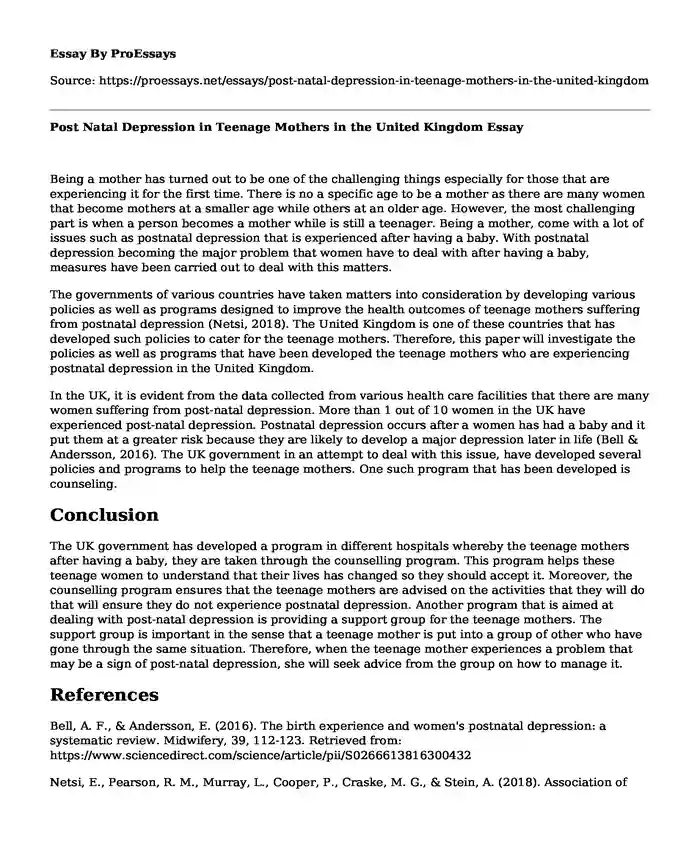Being a mother has turned out to be one of the challenging things especially for those that are experiencing it for the first time. There is no a specific age to be a mother as there are many women that become mothers at a smaller age while others at an older age. However, the most challenging part is when a person becomes a mother while is still a teenager. Being a mother, come with a lot of issues such as postnatal depression that is experienced after having a baby. With postnatal depression becoming the major problem that women have to deal with after having a baby, measures have been carried out to deal with this matters.
The governments of various countries have taken matters into consideration by developing various policies as well as programs designed to improve the health outcomes of teenage mothers suffering from postnatal depression (Netsi, 2018). The United Kingdom is one of these countries that has developed such policies to cater for the teenage mothers. Therefore, this paper will investigate the policies as well as programs that have been developed the teenage mothers who are experiencing postnatal depression in the United Kingdom.
In the UK, it is evident from the data collected from various health care facilities that there are many women suffering from post-natal depression. More than 1 out of 10 women in the UK have experienced post-natal depression. Postnatal depression occurs after a women has had a baby and it put them at a greater risk because they are likely to develop a major depression later in life (Bell & Andersson, 2016). The UK government in an attempt to deal with this issue, have developed several policies and programs to help the teenage mothers. One such program that has been developed is counseling.
Conclusion
The UK government has developed a program in different hospitals whereby the teenage mothers after having a baby, they are taken through the counselling program. This program helps these teenage women to understand that their lives has changed so they should accept it. Moreover, the counselling program ensures that the teenage mothers are advised on the activities that they will do that will ensure they do not experience postnatal depression. Another program that is aimed at dealing with post-natal depression is providing a support group for the teenage mothers. The support group is important in the sense that a teenage mother is put into a group of other who have gone through the same situation. Therefore, when the teenage mother experiences a problem that may be a sign of post-natal depression, she will seek advice from the group on how to manage it.
References
Bell, A. F., & Andersson, E. (2016). The birth experience and women's postnatal depression: a systematic review. Midwifery, 39, 112-123. Retrieved from: https://www.sciencedirect.com/science/article/pii/S0266613816300432
Netsi, E., Pearson, R. M., Murray, L., Cooper, P., Craske, M. G., & Stein, A. (2018). Association of persistent and severe postnatal depression with child outcomes. JAMA psychiatry, 75(3), 247-253. Retrieved from: https://jamanetwork.com/journals/jamapsychiatry/article-abstract/2670696\
Cite this page
Post Natal Depression in Teenage Mothers in the United Kingdom. (2024, Jan 13). Retrieved from https://proessays.net/essays/post-natal-depression-in-teenage-mothers-in-the-united-kingdom
If you are the original author of this essay and no longer wish to have it published on the ProEssays website, please click below to request its removal:
- The Impact of the Mental Capacity Act of 2005
- Essay Sample on Mental Health Treatment
- Supreme Court Rulings and Its Impact on America Essay
- Essay Sample on Chinese Culture
- How to Improve Democracy in America - Research Paper
- Impacts of Violence, Poverty and HIV Infection on African American Transgender Females - Essay Sample
- Paper Sample on Immigration to the U.S.: Detention and Discrimination of Foreigners







